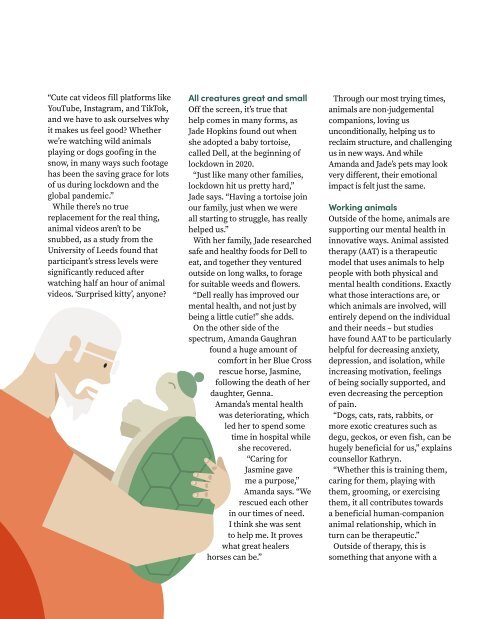Create successful ePaper yourself
Turn your PDF publications into a flip-book with our unique Google optimized e-Paper software.
“Cute cat videos fill platforms like<br />
YouTube, Instagram, and TikTok,<br />
and we have to ask ourselves why<br />
it makes us feel good? Whether<br />
we’re watching wild animals<br />
playing or dogs goofing in the<br />
snow, in many ways such footage<br />
has been the saving grace for lots<br />
of us during lockdown and the<br />
global pandemic.”<br />
While there’s no true<br />
replacement for the real thing,<br />
animal videos aren’t to be<br />
snubbed, as a study from the<br />
University of Leeds found that<br />
participant’s stress levels were<br />
significantly reduced after<br />
watching half an hour of animal<br />
videos. ‘Surprised kitty’, anyone?<br />
All creatures great and small<br />
Off the screen, it’s true that<br />
help comes in many forms, as<br />
Jade Hopkins found out when<br />
she adopted a baby tortoise,<br />
called Dell, at the beginning of<br />
lockdown in 2020.<br />
“Just like many other families,<br />
lockdown hit us pretty hard,”<br />
Jade says. “Having a tortoise join<br />
our family, just when we were<br />
all starting to struggle, has really<br />
helped us.”<br />
With her family, Jade researched<br />
safe and healthy foods for Dell to<br />
eat, and together they ventured<br />
outside on long walks, to forage<br />
for suitable weeds and flowers.<br />
“Dell really has improved our<br />
mental health, and not just by<br />
being a little cutie!” she adds.<br />
On the other side of the<br />
spectrum, Amanda Gaughran<br />
found a huge amount of<br />
comfort in her Blue Cross<br />
rescue horse, Jasmine,<br />
following the death of her<br />
daughter, Genna.<br />
Amanda’s mental health<br />
was deteriorating, which<br />
led her to spend some<br />
time in hospital while<br />
she recovered.<br />
“Caring for<br />
Jasmine gave<br />
me a purpose,”<br />
Amanda says. “We<br />
rescued each other<br />
in our times of need.<br />
I think she was sent<br />
to help me. It proves<br />
what great healers<br />
horses can be.”<br />
Through our most trying times,<br />
animals are non-judgemental<br />
companions, loving us<br />
unconditionally, helping us to<br />
reclaim structure, and challenging<br />
us in new ways. And while<br />
Amanda and Jade’s pets may look<br />
very different, their emotional<br />
impact is felt just the same.<br />
Working animals<br />
Outside of the home, animals are<br />
supporting our mental health in<br />
innovative ways. Animal assisted<br />
therapy (AAT) is a therapeutic<br />
model that uses animals to help<br />
people with both physical and<br />
mental health conditions. Exactly<br />
what those interactions are, or<br />
which animals are involved, will<br />
entirely depend on the individual<br />
and their needs – but studies<br />
have found AAT to be particularly<br />
helpful for decreasing anxiety,<br />
depression, and isolation, while<br />
increasing motivation, feelings<br />
of being socially supported, and<br />
even decreasing the perception<br />
of pain.<br />
“Dogs, cats, rats, rabbits, or<br />
more exotic creatures such as<br />
degu, geckos, or even fish, can be<br />
hugely beneficial for us,” explains<br />
counsellor Kathryn.<br />
“Whether this is training them,<br />
caring for them, playing with<br />
them, grooming, or exercising<br />
them, it all contributes towards<br />
a beneficial human-companion<br />
animal relationship, which in<br />
turn can be therapeutic.”<br />
Outside of therapy, this is<br />
something that anyone with a<br />
62 | <strong>April</strong> <strong>2021</strong> | happiful.com

















